 Image search results - "Osaka" Image search results - "Osaka" |

A symbol of Osaka and one of Japan's largest reconstructed castles. Originally built by Toyotomi Hideyoshi in 1583. The castle tower was reconstructed in 1931 and underwent major renovation during 1995-97 and serves as a very modern history museum. Closest station is Osaka-jo Koen Station.
|
|

The original Osaka Castle built by Toyotomi Hideyoshi was actually buried (smothered) by the Tokugawa and a new castle was built on it. Aoya-mon Gate 青屋門. Rebuilt in 1970.
|
|

Aoya-mon GateRebuilt in 1970. Although this is not the main or front gate, it is the closest castle gate to Osaka-jo Koen Station.
青屋門
|
|
|

Inner moat
|
|
|

In 2006, a rare folding screen painting showing Osaka Castle during Hideyoshi's years in early 17th century was found at Schloss Eggenberg Castle in Austria.http://www.museum-joanneum.at/en/schloss_eggenberg/saka-zu-bybu-1
|
|

Gokuraku-bashi BridgeMeans Paradise Bridge. The original bridge was wooden. Rebuilt in 1965. It connects the Yamazato-maru section with the Ninomaru section.
極楽橋
|
|

Gokuraku-bashi Bridge
|
|

Imamiya Ebisu Shrine is dedicated to Ebisu, one of the Seven Gods of Good Fortune, representing business prosperity. On Jan. 9-11 (centering on the 10th), the shrine holds one of Japan's largest Toka Ebisu festivals to pray for good business. The festival is perhaps Japan's most commercial festival where souvenirs and trinkets for business prosperity are sold. Photo: The road from the subway station to the shrine is decorated.
|
|

Gokuraku-bashi Bridge
|
|

Path near the shrine is filled with street stalls selling Ebisu decorations and charms.
|
|

Osaka Castle was built on the foundations of Ishiyama Honganji, a fortress-like temple.
|
|

Ebisu decorations
|
|

Path to castle tower
|
|
|

Slope to castle tower
|
|
|

About the castle
|
|

Torii and entrance to Imamiya Ebisu Shrine
|
|

Castle map
|
|

Imamiya Ebisu Shrine
|
|

Castle towerIt is modeled after the tower built by the Tokugawa shogunate who made it bigger than the castle Toyotomi Hideyoshi had built. One reason why it's such a big castle.
|
|
|

Castle tower, reconstructed in 1931, was renovated in 1995-97.The exterior walls are gleaming white and bright gold ornaments shine in the sun.
|
|
|

Osaka Castle tower closeup
|
|

Imamiya Ebisu Shrine, Osaka
|
|
|
|

A giant umbrella serves as the roof.
|
|

Castle tower
|
|
|
|
|

Giving out free bamboo branches under the giant umbrella.
|
|
|

Here you go...
|
|

Kadomatsu at castle tower entranceNew Year's decoration
|
|

The small bamboo branches festoon the huge crowd on Jan. 10.
|
|

Castle tower
|
|

Replenishing the supply of bamboo branches.
|
|

Castle tower entrance
|
|

Money pit
|
|

Inside castle tower
|
|

The shrine rakes in the money on its most important day of the year, Jan. 10.
|
|

Inside castle tower
|
|

Who says money can't buy happiness?
|
|

Castle tower balcony
|
|

New Year's decorations trashed at the shrine to be burned.
|
|

Castle tower balcony
|
|

Hauling away the old New Year's decorations.
|
|

Castle tower balcony
|
|

People line up to decorate their free bamboo branches with various lucky decorations.
|
|

View of Nishinomaru Garden from castle tower
|
|

Empty branches waiting for all the trimmings (at a price).
|
|

View from castle tower
|
|

Shrine maidens happily sell and attach lucky decorations on the branches.
|
|

Shachihoko
|
|

Higashi-mon east gate
|
|

Expo '70 Time CapsuleThe plaque reads that the time capsule is to be opened in 5000 years or the year 6970. It can also be opened at the start of each century. I wonder if it was opened in 2001.
|
|

2007 is the Year of the Boar, decoration created by over 500 students at a local elementary and junior high school.
|
|

Sakura-mon Gate with kadomatsu New Year's decoration
|
|

Higashi-mon east gate
|
|

Kadomatsu New Year's decorationLeft side of Sakura-mon Gate.
|
|

Shrine maidens decorate bamboo branches or rakes.
|
|

Kadomatsu New Year's decorationRight side of Sakura-mon Gate.
|
|

Shrine maidens decorate bamboo branches or rakes.
|
|

Tamon Yagura Turret and Daimon GateJapan's largest turret of this type where the turret above is integrated with the gate below. First built in 1628, reconstructed in 1848 and renovated in 1969.
多聞櫓と大門
|
|

Good-looking shrine maidens decorate bamboo branches or rakes.
|
|

Tamon Yagura Turret and Daimon Gate
|
|

Toka Ebisu, Imamiya Ebisu Shrine, Osaka
|
|

The castle's fourth and fifth largest stones.Brought by the Tokugawa during construction. Next to Tamon Yagura Turret and Daimon Gate.
|
|

Even gaijin shrine maidens decorate bamboo branches or rakes. Toka Ebisu, Imamiya Ebisu Shrine, Osaka
|
|

Otemon Gate大手門
|
|

Even gaijin shrine maidens decorate bamboo branches or rakes. Toka Ebisu, Imamiya Ebisu Shrine, Osaka
|
|

Near Otemon Gate
|
|

Fully-loaded "lucky rake."
|
|

Near Otemon Gate
|
|

Sacred dance performed at cost.
|
|

Sengan Turret near Otemon GateOne of the castle's oldest remaining buildings built in 1620. Underwent major restoration in 1961. Overlooking the outer moat.
千貴櫓
|
|

More stalls behind the shrine.
|
|

Otemon Gate in the distance
|
|
|

Outer moat and Sengan Turret
|
|

Omikuji fortune paper strips for sale at 200 yen.
|
|
|
|

Castle towerThis picture was taken before the 1995-97 renovation.
|
|

Omikuji fortune paper strips
|
|

Castle tower
|
|

Good Luck Palanquin procession on Jan. 10. They are entering the shrine's East Gate. 宝恵駕籠
|
|

Castle tower
|
|
|

Crowd at Osaka Tenmangu Shrine, the organizer of the Tenjin Festival and starting point of the festival's Land Procession called "Riku-togyo." 大阪天満宮One of Japan's Big Three Festivals (besides Kyoto's Gion Matsuri and Tokyo's Kanda Matsuri) is also Osaka's biggest summer festival held on July 24-25. These photos were taken on July 25, 2004. The festival has a procession starting from Tenmangu Shrine in the afternoon and a water procession on the river in the evening.
|
|
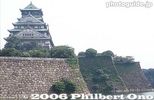
Castle tower
|
|

Geisha on palanquin.
|
|

Spectators wait near Tenmangu Shrine's torii for the Land Procession (Riku-togyo) to start at 4 pm on July 25, the festival's 2nd day. The shrine is near Minami-morimachi Station on the Tanimachi subway line. 陸渡御
|
|

One of the largest stones
|
|

The procession includes geisha and other celebrities.
|
|

The Land Procession is one of the festival's two main events. It starts with a group of taiko drummers.
|
|
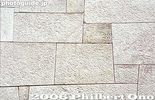
Stone wall pattern
|
|

Even a bunraku puppet walks in the parade.
|
|

Taiko drummers at the shrine's Otorii gate. 催太鼓
|
|
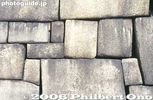
Stone wall pattern
|
|
|
|
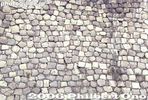
Stone wall pattern
|
|

Kimono-clad beauties, winners of some Miss contest.
|
|

Sarutahiko on horseback 猿田彦
|
|

Moat
|
|

Fuku-musume or Lucky Maidens
|
|

About 3,000 people are in the procession which follows a 4 km route from the shrine to a boat landing near Tenjin-bashi Bridge on the Okawa River. 陸渡御
|
|
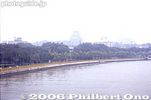
View of castle from Nakanoshima
|
|

Fuku-musume or Lucky Maiden
|
|
|
|

Miss Ebisu-bashi
|
|

Danjiri float 地車
|
|
|

Danjiri float 地車
|
|

The Fuku-musume or Lucky Maidens are all nice-looking.
|
|

Shishimai lion dance
|
|
|
|
|

Geisha
|
|

Lion dance
|
|

Fuku-musume or Lucky Maidens
|
|

Hanagasa dancers 花傘
|
|

Miss Ebisu-bashi Runner-up
|
|

花傘
|
|

Miss Ebisu-bashi Runner-up
|
|
|
|

Shinsaibashi Top Lady
|
|
|

Start of the procession's return trip from the shrine.とんぼりリバーウォーク→大和屋→道頓堀東映→B1角座(10:00)→松竹座→戎橋橋詰→千日前国際劇場→吉本会館→今宮戎神社(12:10頃)→なんばCITY→高島屋→大丸→大和屋
|
|

Hanagasa umbrella dancers 花傘
|
|

Ebisu on a palanquin.
|
|

Hanagasa umbrella dancers, Tenjin Matsuri, Osaka 花傘
|
|

Geisha
|
|
|
|

Geisha on a palanquin
|
|
|

Geisha on a palanquin, Toka Ebisu, Imamiya Ebisu Shrine, Osaka
|
|
|
|
|
|
|
|
|
|

Chigo child
|
|
|
|
|

Cart for the Lucky Maiden
|
|

牛曳童児
|
|

Fuku-musume Lucky Maiden
|
|

Shrine priest
|
|

Slim-looking Ebisu
|
|

御羽車
|
|

Cart for Miss Ebisu-bashi
|
|

Portable shrine 御羽車
|
|

Miss Ebisu-bashi
|
|

Mother and twins in yukata
|
|

Miss Ebisu-bashi, Toka Ebisu, Imamiya Ebisu Jinja, Osaka
|
|
|
|

Shinsaibashi Top Lady cart
|
|
|

Shinsaibashi Top Lady
|
|
|
|

Another Shinsaibashi Top Lady
|
|
|
|
|
|
|
|
|

Portable shrine housing the spirit of Sugawara Michizane. This is the most important thing in the procession. 御鳳輦
|
|
|
|
|
|
|
|
|

People patting a lucky mirror?
|
|

Never-ending sales pitch on Toka Ebisu Day. All these good-looking girls make you wanna buy something.
|
|

The shrine is surrounded by Ebisu street stalls.
|
|
|
|

Crowd near Tenjin-bashi Bridge.
|
|

By 6 pm, shrine parishioners started boarding boats near Tenjin-bashi Bridge, the starting point of the Boat Procession. These are supporter's boats.
|
|

These boats will carry portable shrines.
|
|

A large crane is used to carry the portable shrines onto the boats.
|
|

Crowded walking path along Okawa River. Most people view the festival from the riverside.
|
|

The Boat Procession started at 7 pm on Okawa River. These boats are called Dondoko. どんどこ船 大川 船渡御
|
|

The Boat Procession (Funa-togyo) is the Tenjin Matsuri festival's main event.
|
|
|

The boats are numerous. About 100 of them go up and down the river.
|
|

Most of the boats carry parishioners who eat bento on the boats while sometimes looking at photographers shooting them from a bridge overhead.
|
|

Okawa River 大川
|
|

The boats are large barges.
|
|

To ride these boats, you have to be a member of a shrine parish or supporting group.
|
|

船渡御
|
|
|

The fire, fueled by LP gas, is on a corporate-sponsored boat, used for illumination. 大篝
|
|
|
|

Tugboats pull these huge barges.
|
|

Ningyo-bune 人形船
|
|
|
|
|

Boat corner
|
|
|
|
|
|

船渡御
|
|

船渡御
|
|
|
|
|
|

The boat carrying the portable shrine housing the spirit of Sugawara Michizane. 御鳳輦奉安船
|
|

This is the most important boat in the procession. It holds a ceremony called the Senjo-sai (船上祭) in the middle of the river to celebrate Sugawara Michizane's birthday. 御鳳輦奉安船
|
|

玉御神輿奉安
|
|

Portable shrine 船渡御 玉御神輿奉安
|
|

Horrendous crowd gathers to watch the fireworks, the festival's climax. The festival ends at 10 pm when the procession returns to the shrine.
|
|
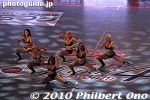
The bj-league's final and championship game for the 2009-2010 season was held on May 23, 2010 at Ariake Coliseum in Koto Ward, Tokyo. Golden State Warrior Girls from California perform as special guests at the Final Four games.
|
|
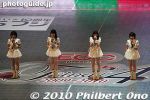
Female group called S/mileage.
|
|
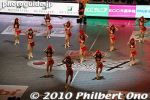
Osaka Evessa was the Western Conference champion. Evessa cheerleaders performed during the pregame show of the bj-league's final and championship game.
|
|
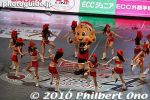
Osaka Evessa cheerleaders.
|
|
|
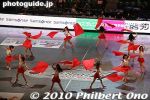
Higashi-Mikawa Hamamatsu Phoenix was the Eastern Conference champion. Phoenix Firegirls cheerleaders perform during the pregame show.
|
|
|
|
|
|
|
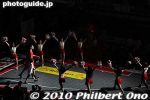
Introducing Phoenix players
|
|
|
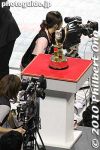
bj-league championship trophy. Thought it would be bigger than that. Lots of women camera operators these days too.
|
|
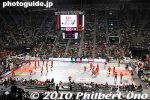
Pregame practice by both teams.
|
|
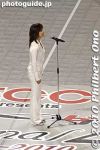
Singer of national anthem.
|
|
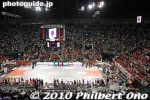
Singing the national anthem.
|
|
|
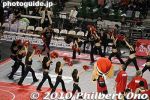
Introducing Evessa players
|
|
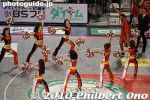
Introducing Phoenix players
|
|
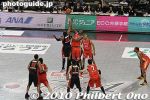
Championship game tip off
|
|

Evessa in black and Phoenix in orange jersey.
|
|
|
|
|
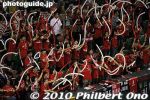
Evessa boosters booing a free throw by Phoenix.
|
|
|
|
|
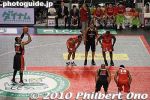
Free throw
|
|
|
|
|
|
|
|
|
| 1092 files on 5 page(s) |
1 |
 |
 |
|